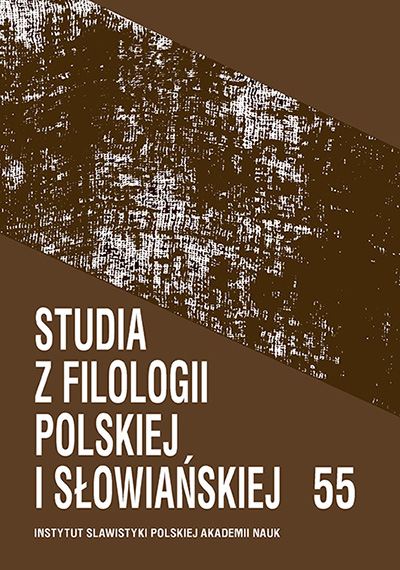Внесок Харківської лінгвістичної школи у становлення й розвиток теорії невербальної комунікації
Contribution of the Kharkiv Linguistic School to the Formation and Development of Theory of Non-Verbal Communication
Author(s): Tetiana OsipovaSubject(s): Language and Literature Studies, Philology
Published by: Instytut Slawistyki Polskiej Akademii Nauk
Keywords: non-verbal communication; non-verbal communication theory; Kharkiv linguistic school; periodisation of the development of non-verbal communication theory; pragmalinguistics; discourse practice
Summary/Abstract: This article describes contribution of the Kharkiv linguistic school to the formation of theory of non-verbal communication (NVC) and indicates the periods of its development in Ukrainian linguistics: from the psycholinguistic research of Oleksandr Potebnia (the late nineteenth century) to modern pragmalinguistic studies. The article aims to familiarise the European scholarly community with theoretical achievements of world-class Ukrainian linguists: Oleksandr Potebnia, Leonid Bulakhovs′kyĭ, Iuriĭ Shevel′ov (Iuriĭ Sherekh, George Shevelov), who directly or indirectly formed a theory of non-verbal communication (its methodological postulates, typology of non-verbal parameters, terminology), as well as with achievements of their followers, representatives of the pragmalinguistic branch of the Kharkiv linguistic school, exploring issues of NVC theory in the framework of discourse theory. Modern Ukrainian linguists actively develop non-verbal communication theory in relation to discourse practice (theoretical, terminological, stylistic, ethnocultural, idiolectic, gender and lexicographic aspects) and declare to have worked out a methodology for a comprehensive analysis of the non-verbal communication system on the basis of oral and written Ukrainian material. However, the article draws attention to the lack of a national Ukrainian theoretical platform, uniform NVC metalanguage and research methods, and identifies this issue as the most pressing research challenge. Based on the presented conceptualisations, the article identifies five periods of the formation and development of the Ukrainian theory of NVC, as reflected in the achievements of the most well-known and the strongest school in Ukrainian linguistics: (1) the initial period: late 19th – early 20th centuries; (2) the avant-garde period: 1920s–1930s; (3) the Soviet period: 1930s–1960s; (4a) the (“post-Soviet”) diaspora period (1970s); (4b) the post-Soviet period (1990s); (5) the current period: since the early 2000s. The article also outlines research prospects in this study area.
Journal: Studia z Filologii Polskiej i Słowiańskiej
- Issue Year: 2020
- Issue No: 55
- Page Range: 1-16
- Page Count: 16
- Language: Ukrainian

